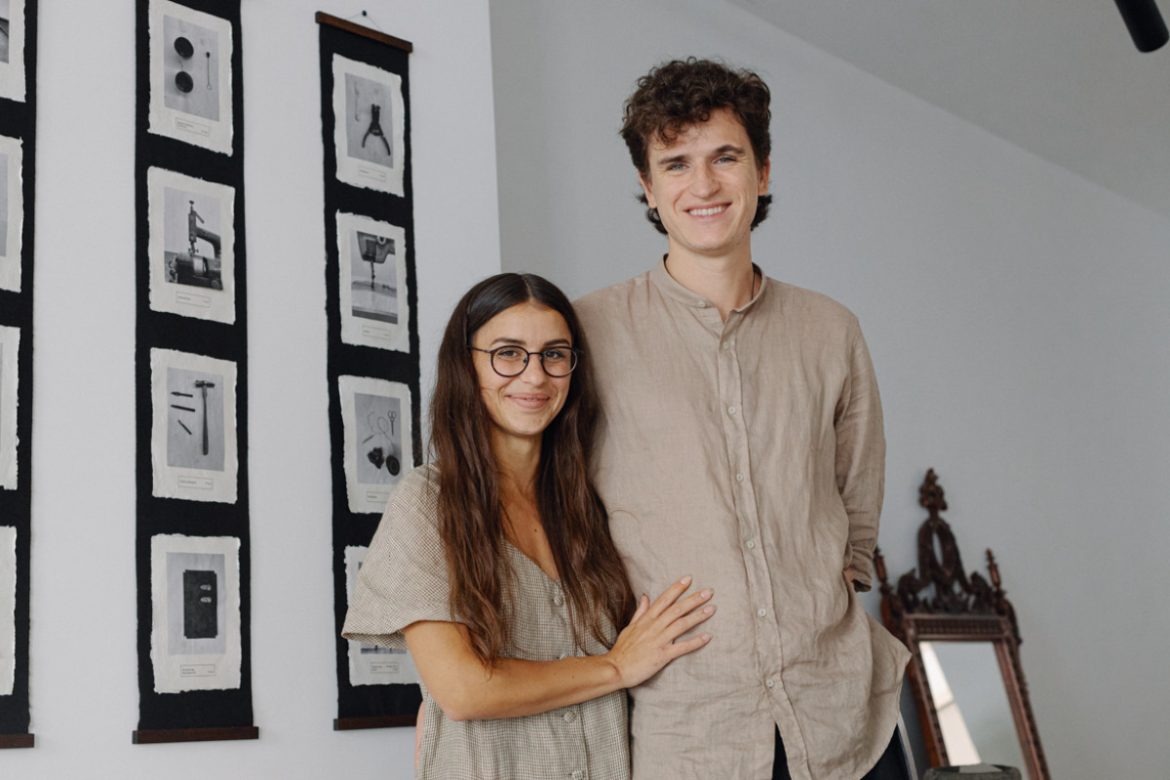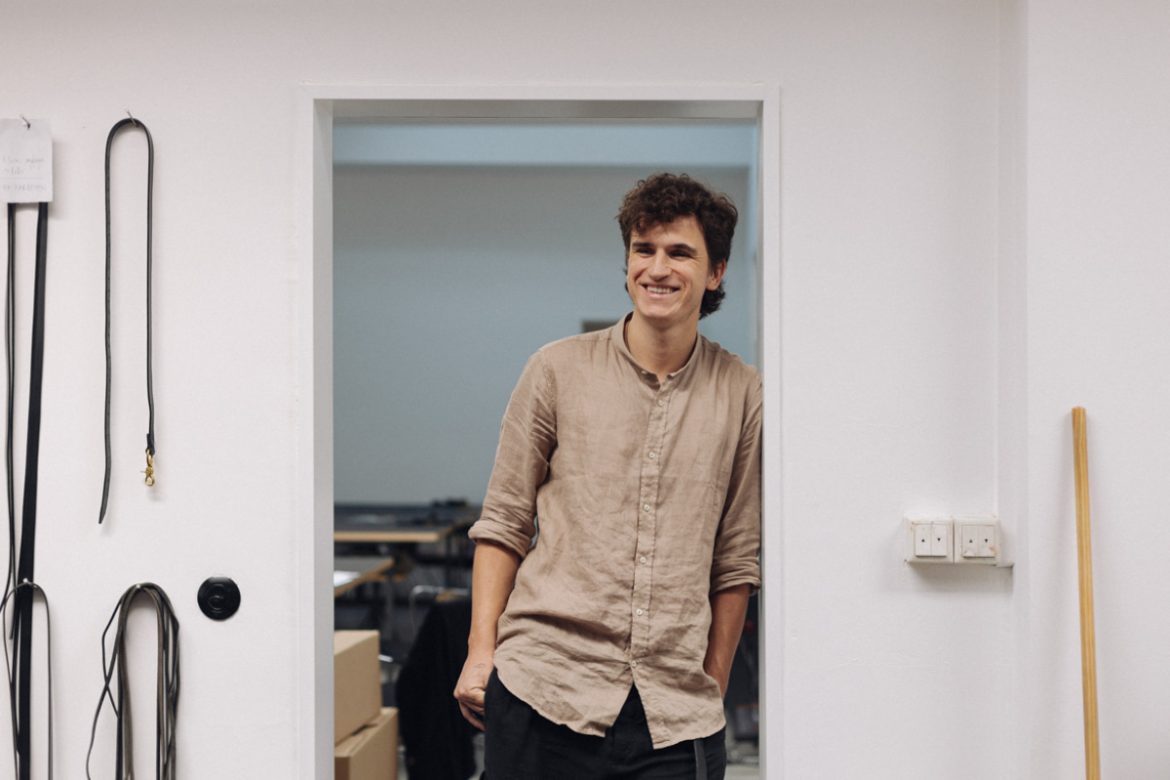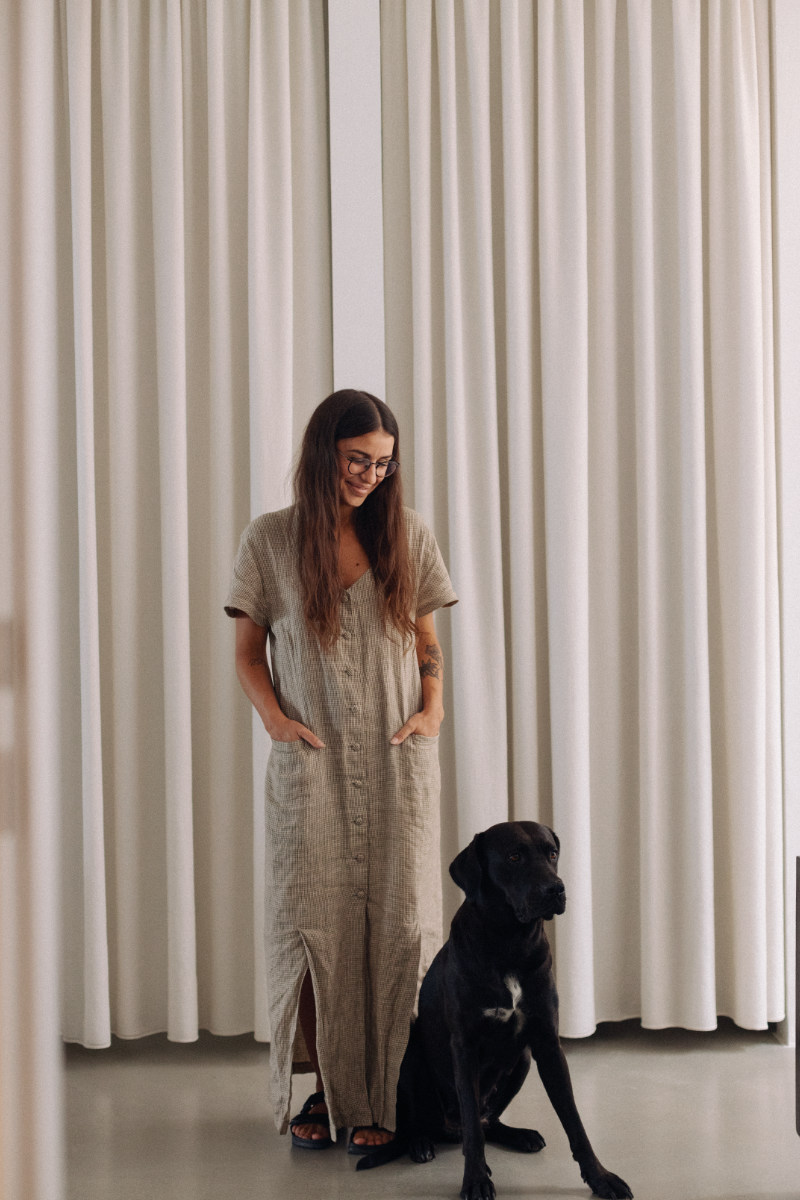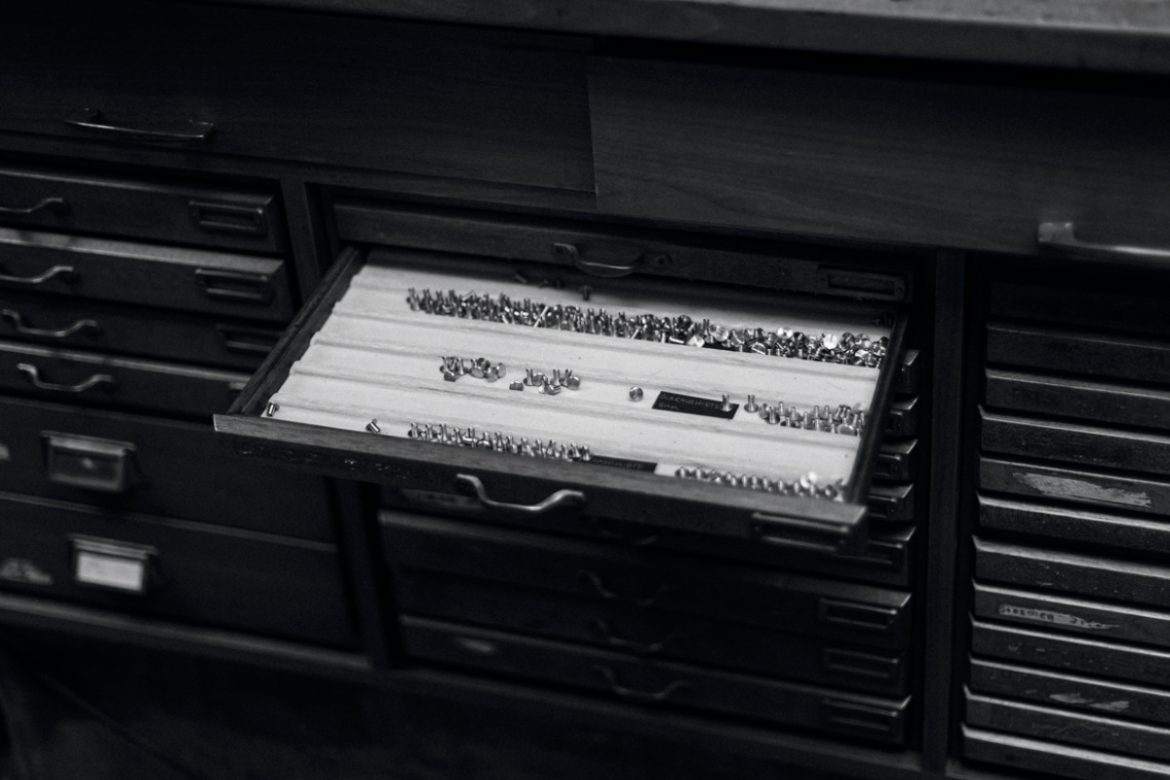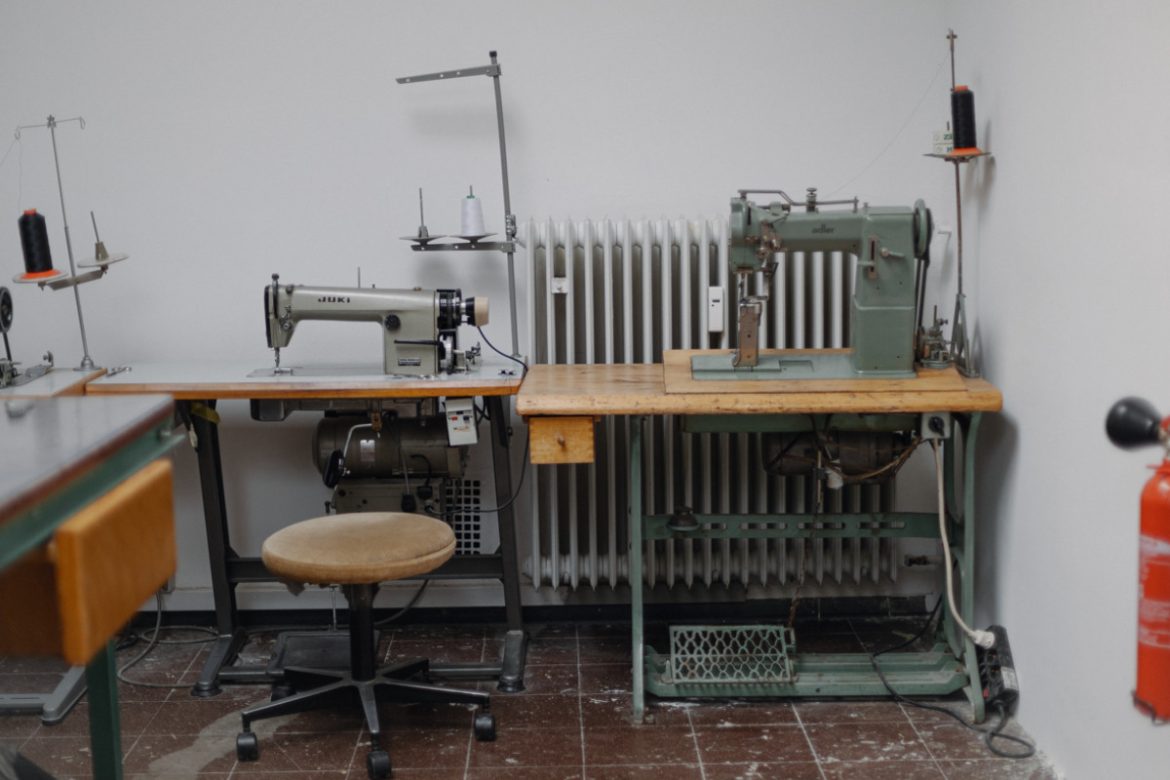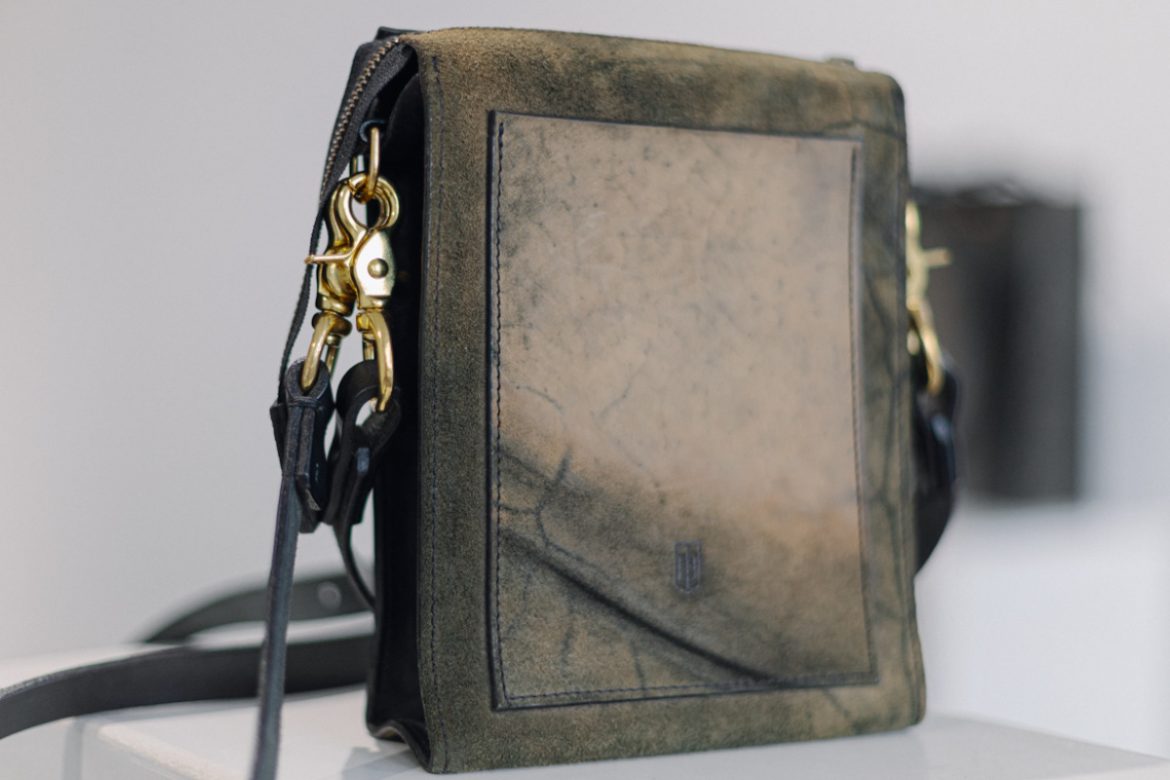Vollständiger Name: Jasmin Schmitz & Max Boss
Beruf: Design-Ingenieurin & Atem-Körper- und Traumatherapeut
Gelernter Beruf: Design-Ingenieur/ Design-technische Assistentin & Studium Wirtschaftspsychologie
Alter: 30 & 33 Jahre
Hund: Motte, 3 Jahre alt, italienische Dogge, Türsteherin
Name Label: Monolar
URL: monolar.eu
Social Media: @monolar.eu
Für das Label Monolar gehen Design und Handwerkskunst untrennbar nebeneinanderher. Der Name verweist auf elegante Unikate in Form von Ledertaschen und Accessoires, die in Handarbeit zu lebenslangen Begleitern gefertigt werden. Mit einer Philosophie, die sich der Nachhaltigkeit und Wertschätzung verschreibt, steckt hinter dem ästhetischen Aussehen der Produkte allerdings noch viel mehr. Jasmin Schmitz und Max Boss haben mit ihrem Monolar.Studio in Pempelfort einen Raum geschaffen, der nicht nur den aufwendigen Herstellungsprozess sichtbar macht, sondern auch die Gelegenheit bietet, mit verschiedenen Meditations- und Yogaklassen der ständigen Hektik im Leben entgegenzutreten. Somit entsteht eine Symbiose, die auch den Blick auf schnelllebigen Konsum richtet, bei dem die Herkunft und Entstehung der Gegenstände oft unhinterfragt bleiben. Monolar zeigt, dass es anders gehen kann und dass die Wertschätzung für das Produkt samt seiner Geschichte ein bedeutender Faktor für dessen Qualität und Schönheit ist.
>>Please scroll down for English version!<<
Wie kam es zur Gründung von Monolar?
Jasmin: Das Label Monolar habe ich Ende 2017, Anfang 2018 noch während des Studiums gegründet. Ich habe mich schon immer für die Verarbeitung von Leder und Lederaccessoires interessiert, es kam aber kaum in meiner Ausbildung und im Studium vor. Deswegen habe ich mich selbst immer mehr damit beschäftigt und für ein Label gearbeitet, das Handtaschen fertigt. Dann habe ich mein erstes eigenes Atelier angemietet und die ersten Artikel gefertigt. Ich wusste schon immer, dass ich mich selbständig machen möchte. Und weil vieles an Bekleidung nicht meinem Empfinden von Nachhaltigkeit entspricht, dachte ich, dass Accessoires passend sind. Jeder kann sie unabhängig von Geschlecht oder Alter tragen.
Welche Bedeutung hat der Begriff “Nachhaltigkeit” für Euch?
Jasmin: Dadurch, dass ich mich im Studium sehr intensiv damit auseinandergesetzt habe, habe ich gelernt, dass es viele unterschiedliche Sichtweisen auf Nachhaltigkeit gibt. Ich konnte für mich feststellen, dass ich es sehr wichtig finde, im Einklang mit der Natur zu sein. Wenn ich etwas erschaffe, möchte ich, dass es rückführbar ist und man nichts Artifizielles hinterlässt. Ich finde es zum Beispiel interessant, wenn ein Tisch 300 Jahre überdauern kann und eine Geschichte hat, auch auf einer energetischen Ebene. Im Moment geht es in der Modewelt viel darum, wie sich Plastik recyceln lässt. Zum Beispiel gibt es ein neues Polyester, das aus Plastikflaschen besteht. Das sind für mich Dinge, die nicht ganz zu Ende gedacht und nicht 100% nachhaltig sind. Die Problematik, was mit dem Stoff am Ende passiert, bleibt. Natürliche Textilien aus Leinen, Wolle, Baumwolle oder Leder können kompostiert und wieder in die Natur zurückgegeben werden.
Ein zentraler Begriff für Monolar ist “Wertschätzung”. Warum ist es Euch wichtig, ein Label zu führen, das nicht nur auf die äußerliche Ästhetik der Produkte bedacht ist? Wie ist im Vergleich dazu Euer Blick auf die Mode- und Designwelt?
Max: Wertschätzung ist eine Gemeinsamkeit unserer Arbeit, die wir auf einer Metaebene teilen. Ich schaffe sie, mit und für die Menschen, mit denen ich in unserem Studio arbeite. Durch Wertschätzung wird man feinfühliger für den Entstehungsprozess hinter den Produkten und fragt sich, welche Gedanken oder Philosophien dahinterstecken. Die Idee der Wertschätzung für Dinge, die produziert wurden, gibt es schon länger. Aber was wir, vor allem Jasmin als Designerin, gesehen haben, ist, dass bei manchen Dingen das Ästhetische fehlt.
Jasmin: In der Modewelt ist es außerdem durch die bestehenden Produktionsstrukturen und Standorte fast nicht möglich, mit Nachhaltigkeit und Wertschätzung zu arbeiten. Man kann Leute in Bangladesch mit besseren Löhnen unterstützen, aber es ist nicht nachhaltig, die Produkte durch die ganze Welt zu schicken. Ich wollte mit Monolar ein Label gründen, das alles abdeckt und keine Abkürzungen nehmen muss, die oft in Greenwashing enden. Der Mensch, der dahintersteht, der das Produkt gefertigt hat, soll die Wertschätzung erhalten. Das steht für mich auch im Design im Vordergrund. Bei der Verarbeitung kann man sehen, wie viel Zeit und Muße da drinsteckt.
Wenn man sehr auf Labels steht und sich gern mit den besten Marken und neuesten Sachen eindeckt, möchte man irgendwo dazugehören oder eine innere Leere füllen. Wenn man aber, wie Max mit seinen Klienten, sich viel mit sich selbst beschäftigt, fällt das irgendwann weg. Man hat nicht den Drang, sich mit Prestige zu schmücken, sondern achtet vielmehr auf die Qualität der Produkte, die langlebig sind und eine Geschichte haben – und trotzdem gut aussehen dürfen.
Max: Der Shift dahin muss aber nicht so extrem sein, dass man alles wegschmeißt und nur noch Dinge kauft, die nachhaltig oder wertschöpfend produziert sind. Man muss nicht von einem ins nächste Extrem gehen.
Mit Monolar.Studio bietet Ihr auch Klassen und Workshops für Yoga, Meditation und alternative Heilverfahren an. Wie kam diese Verbindung zustande?
Jasmin: Monolar.Studio ist der Raum, den wir geschaffen haben, wo sich Max’ und meine Arbeit treffen, es ist aber noch mehr als das. Darüber hinaus kuratieren wir für andere Kunsthandwerker:innen, Designer:innen und Kunstschaffende unsere Handverlesen-Veranstaltungen, wo wir auf die Wertschätzung eingehen und Produkte, die Menschen mit ihren Händen geschaffen haben, präsentieren wollen. Wir fanden es schön, die Möglichkeit zu haben, etwas ganz Anderes zu machen: Ein Ladengeschäft, wo man gleichzeitig Meditation praktizieren oder Yogaklassen besuchen kann.
Max: Wir fanden es passend, in diesem Raum zusammen zu sein, weil Jasmin dort Produkte verkauft und ich Philosophien in Form von Klassen weitergebe. Sie beziehen sich auf die physische und mentale Gesundheit und helfen, eine Offenheit und Sensibilität nicht nur für sich, sondern auch für das, was man bei sich trägt, zu entwickeln.
Wie sieht der Herstellungsprozess Eurer Produkte aus?
Jasmin: Monolar.Studio ist unser Verkaufsraum und der Raum, in dem Max seine Arbeit praktiziert. Mein Atelier ist dahinter angeschlossen. Aktuell wird alles von Hand zugeschnitten und jede Maschinennaht von Hand von mir vernäht. Wir benutzen Pferdeleder, mit dem jedes Stück ein Unikat wird. Auch wenn es das gleiche Modell ist, sieht jede Tasche immer anders aus. Dieser Prozess ist zwar nicht sehr wirtschaftlich, mir aber sehr wichtig. Ich schaue welches Produkt ich aus der Haut machen kann und welches Modell damit zusammenpasst. Mittlerweile sind wir aber an einem Punkt angekommen, an dem es für eine Person zu viel wird. Deshalb arbeite ich in Zukunft mit einer kleinen Manufaktur aus der Region zusammen. Dort werde ich bei allen Maschinennähten unterstützt. Die Handarbeiten bleiben weiterhin bei uns im Atelier.
Max: Die Manufaktur ist ein schon lange bestehendes Familienunternehmen in Solingen, das noch sehr alte Maschinen verwendet. Der Maschinenpark fühlt sich immer auch ein bisschen wie ein Museum an. Jasmin war es wichtig, dort vorbeikommen zu können, um das Material selbst zu stanzen und um zu sehen, welcher Lederausschnitt zu welchem Produkt wird.
Warum eignet sich Leder besonders gut als Hauptmaterial für Eure Produkte?
Jasmin: Ich habe mich schon in meiner Bachelorarbeit mit pflanzlichen Lederalternativen auseinandergesetzt, indem ich versucht habe, selbst eine zu entwickeln, die genau den gleichen Ansprüchen gerecht werden kann, was mir nicht gelungen ist. Aktuell ist Leder das beste Material, weil es sehr langlebig ist. Wenn man es gut pflegt, kann es drei bis vier, manchmal sogar noch mehr Generationen überdauern. Außerdem ist es im Grunde auch ein Naturprodukt. Die Tiere werden nicht geschlachtet, um Leder zu produzieren, sondern um Fleisch zu produzieren, wovon Leder das Abfallprodukt ist. In der Welt wird derzeit immer noch sehr viel Fleisch produziert, weshalb es immer noch möglich ist, Leder zu verwenden.
Ich hoffe aber, dass das in Zukunft weniger wird und wir so weit sein werden, Lederalternativen aus natürlichem Ursprung fertigen zu können – zum Beispiel aus Pilzen – die wieder rückführbar sind. Denn wenn ich Leder auf den Komposthaufen gebe, wird es wieder zu Biomasse. Es ist auch wichtig zu sagen, dass wir nur pflanzlich gegerbtes Leder – zum Beispiel mit Eichenrinde oder Mimose – verwenden. Das dauert zwar etwas länger und ist etwas teuer, aber so ist es möglich, es wieder zurückzuführen. Bei den aktuelle Lederalternativen ist es oft so, dass es nicht sehr beanspruchbar wie echtes Leder ist und deswegen einen PA- oder PU-Film erhält. Selbst, wenn eine tolle Alternative wie Ananasfaser verwendet wird, ist sie nicht rückführbar, ohne Mikroplastik freizusetzen, weil sie mit dem Plastikfilm beschichtet ist.
Max: Wir benutzen Pferdeleder, weil es kein Massentierhaltungsprodukt ist. Besonders der Pferdepo steht hier im Vordergrund, weil er die besondere Optik für das Leder mitbringt. Ein Pferd hat in der Regel ein schöneres und freieres Leben als eine Kuh, die neben Milch und Fleisch meistens auch für Leder verwendet wird.
Welche Liebe ist größer: Design oder Handwerkskunst?
Jasmin: Für mich geht beides Hand in Hand. Ein gutes Design lenkt den Blick subtil auf das Material und die Verarbeitung und macht das Produkt im Ganzen stimmig. Handwerkliche Verarbeitung hat für sich eine besondere Ästhetik und ist auch wieder Design. Es ist also nicht trennbar.
Was inspiriert Euch? Gibt es bestimmte Orte in Düsseldorf, an denen Ihr neue Ideen schöpft?
Jasmin: Wir sind so gut wie jeden Tag im Wald – den man auch in Düsseldorf findet! Ich bin immer wieder überrascht, wie die Ideen fließen können, wenn man mit der Natur verbunden ist. Man muss sich Ruhe nehmen und die Inspiration sprießt von allein. Auch immer wieder den Kontrast zwischen Stadt und Wald zu nutzen und einen Stopp-Knopf zu drücken, ist eine Kraft- und Inspirationsquelle in Düsseldorf.
Max: Unabhängig von den Außengeräuschen, ist es mir auch wichtig, in sich Ruhe zu finden. In alten Yogaschriften wird vom Tun im Nichtstun gesprochen, was für mich bedeutet intuitiv zu arbeiten. Das kann beim Kochen ein Gewürz sein, das ich sonst nicht verwende oder ein Handgriff während einer Massage. Das ist die Ruhe, die wir im Wald finden und in den Alltag übertragen, vor allem wenn es in der Stadt hektischer ist. Das funktioniert nicht immer, aber mit der Zeit immer besser.
Habt Ihr eine bestimmte Vision für die Zukunft von Monolar?
Jasmin: Was ich mir generell für die Zukunft wünsche, ist, dass die Produktion und das Design an einem Ort stattfinden und die Symbiose beibehalten wird, sodass ich immer in den handwerklichen Prozess integriert sein kann. Design passiert für mich nicht auf dem Papier, sondern ich designe mit dem Material in meinen Händen.
Max: Wir wollen mit Jasmin als Designerin, mit meiner Arbeit in den Workshops und Kursen und mit den Veranstaltungen zeigen, was wir machen und einen Raum für Austausch auf mehreren Ebenen schaffen.
Jasmin: Vor allem wollen wir das Handwerk erfahrbar machen. Man kann in unseren Laden kommen und sehen, wie die Produkte gefertigt werden. Genau das ist uns für unsere Handverlesen-Veranstaltungen wichtig, die in der Zukunft stattfinden. Demnächst haben wir eine Keramikerin und eine Handweberin dabei. Wer weiß schon genau, welche Arbeit dahintersteckt und wie viel Zeit sie in Anspruch nimmt? Unser Ziel ist es, in einer schnelllebigen Welt anzuhalten und zu zeigen, wie viel Meditatives im Handwerk steckt.
Vielen Dank!
Text: Lisa-Marie Dreuw
Foto: Anna Sokolova
© THE DORF 2024
English version:
Full name: Jasmin Schmitz & Max Boss
Profession: Design Engineer & Breath-Body and Trauma Therapist
Professional education: Design engineer/ design-technical assistant & study of business psychology
Age: 30 & 33 years
Dog: Motte, 3 years old, Italian Mastiff, bouncer
Label name: Monolar
URL: monolar.eu
Social Media: @monolar.eu
For the label Monolar, design and craftsmanship are inseparable. The name refers to elegant one-of-a-kind leather bags and accessories that are handcrafted as lifelong companions. How- ever, with a philosophy dedicated to sustainability and appreciation, there is much more behind the aesthetic look of the products. With their Monolar.Studio in Pempelfort, Jasmin Schmitz and Max Boss have created a space that not only makes the elaborate manufacturing process visible, but also offers the opportunity to counter the constant hectic pace of life with various meditation and yoga classes. Thus, a symbiosis is created that also directs the view on fast-moving con- sumption, in which the origin and creation of the objects often remain unquestioned. Monolar shows that things can be different and that the appreciation for the product including its history is a significant factor for its quality and beauty.
How did the foundation of Monolar come about?
Jasmin: I founded the label Monolar at the end of 2017, beginning of 2018 still during my studies. I have always been interested in working with leather and leather accessories, but it hardly came up in my education and studies. That’s why I got more and more involved with it myself, working for a label that makes handbags. Then I rented my first studio and made the first items. I always knew that I wanted to start my own business. And because a lot of clothing doesn’t match my sense of sustainability, I thought accessories would fit the bill. Anyone can wear them regardless of gender or age.
What does the term “sustainability” mean to you?
Jasmin: Because I dealt with it very intensively in my studies, I learned that there are many different perspectives on sustainability. I was able to determine for myself that I find it very important to be in harmony with nature. When I create something, I want it to be traceable and I don’t want to leave anything artificial behind. For example, I think it’s interesting if a table can last 300 years and has a history, even on an energetic level. Right now, a lot of the fashion world is about how plastic can be recycled. For example, there’s a new polyester that’s made from plastic bottles. To me, these are things that are not fully thought through and are not 100% sustainable. The issue of what happens to the fabric in the end remains. Natural textiles made from linen, wool, cotton or leather can be composted and returned to nature.
A central concept for Monolar is “appreciation”. Why is it important to you to run a label that is not only concerned with the external aesthetics of the products? How does this compare to your view of the fashion and design world?
Max: Appreciation is a commonality in our work that we share on a meta-level. I create it, with and for the people I work with in our studio. Through appreciation, you become more sensitive to the creation process behind products and wonder what thoughts or philosophies are behind them. The idea of appreciation for things that have been produced has been around for a while. But what we’ve seen, especially Jasmin as a designer, is that the aesthetic is missing in some things.
Jasmin: In the fashion world, it’s also almost impossible to work with sustainability and appreciation because of the existing production structures and locations. You can support people in Bangladesh with better wages, but it’s not sustainable to send the products all over the world. I wanted to start a label with Monolar that covered everything and didn’t have to take shortcuts that often end up in greenwashing. The person behind it, who made the product, should get appreciation. For me, that’s also at the forefront of the design. With workmanship, you can see how much time and effort goes into it.
If you’re very into labels and like to stock up on the best brands and latest stuff, you want to belong somewhere or fill an inner void. But if you spend a lot of time on yourself, like Max does with his clients, that eventually falls away. You don’t have the urge to adorn yourself with prestige, but rather pay attention to the quality of the products, which are durable and have a history – and are still allowed to look good.
Max: But the shift there doesn’t have to be so extreme that you throw everything away and only buy things that are produced in a sustainable or value-added way. You don’t have to go from one extreme to the next.
With Monolar.Studio you also offer classes and workshops for yoga, meditation and alternative healing. How did this connection come about?
Jasmin: Monolar.Studio is the space we created where Max’s work and mine meet, but it’s more than that. We also curate our „Handverlesen“ (“Handpicked”) events for other artisans, designers, and art makers, where we aim to address appreciation and showcase products that people have created with their hands. We thought it would be nice to have the opportunity to do something completely different: a retail store where you can practice meditation or attend yoga classes at the same time.
Max: We found it fitting to be together in this space because Jasmin sells products there and I pass on philosophies in the form of classes. They relate to physical and mental health and help develop an openness and sensitivity not only to yourself, but to what you carry with you.
What is the manufacturing process of your products?
Jasmin: Monolar.Studio is our retail space and the space where Max practices his work. My studio is attached behind it. Currently, everything is cut by hand and every machine seam is sewn by hand by me. We use horse leather, which makes each piece unique. Even if it’s the same model, each bag always looks different. This process is not very economical, but it is very important to me. I look at what product I can make from the hide and what model goes with it. In the meantime, however, we have reached a point where it becomes too much for one person. Therefore, in the future I will work with a small manufacture from the region. There I will be supported with all machine sewing. The handicrafts will remain in our studio.
Max: The manufactory is a long-established family business that still uses very old machines. The machinery always feels a bit like a museum, too. It was important to Jasmin to be able to visit there to punch the material herself and to see which leather cutout becomes which product.
Why is leather particularly well suited as the main material for your products?
Jasmin: I already investigated plant-based leather alternatives in my bachelor’s thesis by trying to develop one myself that could meet exactly the same requirements, which I didn’t succeed in doing. Currently, leather is the best material because it is very durable. If you take good care of it, it can last three to four generations, sometimes even more. It’s also basically a natural product. Animals are not slaughtered to produce leather, but to produce meat, of which leather is the waste product. There is still a lot of meat being produced in the world right now, so it is still possible to use leather.
But I hope that in the future this will become less, and we will be able to produce leather alternatives from natural origin – for example from mushrooms – that are recyclable. Because if I put leather on the compost heap, it becomes biomass again. It’s also important to say that we only use vegetable-tanned leather – with oak bark or mimosa, for example. This takes a bit longer and is a bit expensive, but this way it is possible to return it. With the current leather alternatives, it’s often the case that it’s not very durable like real leather and that’s why it gets a PA or PU film. Even if a great alternative like pineapple fiber is used, it’s not recyclable without releasing microplastics because it’s coated with the plastic film.
Max: We use horse leather because it’s not a factory farm product. The horse’s bottom is in the foreground here because it brings the special look for the leather. A horse usually has a nicer and freer life than a cow, which is mostly used for leather in addition to milk and meat.
Which love is greater: design or craftsmanship?
Jasmin: For me,the two go hand in hand. A good design subtly draws the eye to the material and workmanship and makes the product coherent as a whole. Craftsmanship has a special aesthetic and is also designed again. So, it’s not separable.
What inspires you? Are there certain places in Düsseldorf where you draw new ideas?
Jasmin: We’re in the forest pretty much everyday – which you can also find in Düsseldorf ! I’m always surprised how ideas can flow when you’re connected to nature. You must take it easy and inspiration sprouts on its own. Also, always taking advantage of the contrast between the city and the forest and hitting a stop button is a source of strength and inspiration in Düsseldorf.
Max: Regardless of the outside noise, it’s also important for me to find peace within myself. Ancient yoga scriptures speak of doing in doing nothing, which for me means working intuitively. When cooking, this can be a spice that I don’t normally use, or a hand movement during a massage. This is the peace that we find in the forest and transfer to everyday life, especially when it is more hectic in the city. It doesn’t always work, but it gets better with time.
Do you have a specific vision for the future of Monolar?
Jasmin: What I generally want for the future is to have production and design in one place and to keep the symbiosis, so I can always be integrated in the craft process. Design for me doesn’t happen on paper, I design with the material in my hands.
Max: With Jasmin as a designer, with my work in the workshops and courses, and with the events, we want to show what we do and create a space for exchange on multiple levels.
Jasmin: Above all, we want to make the craft tangible. People can come to our store and see how the products are made. That’s what’s important to us for our “Handverlesen” (“Handpicked”) events coming up. Soon we will have a ceramist and a hand weaver as guests. Who knows exactly what work goes into it and how much time it takes? Our aim is to pause in a fast-paced world and show how meditative craft can be.
Thank you very much!




